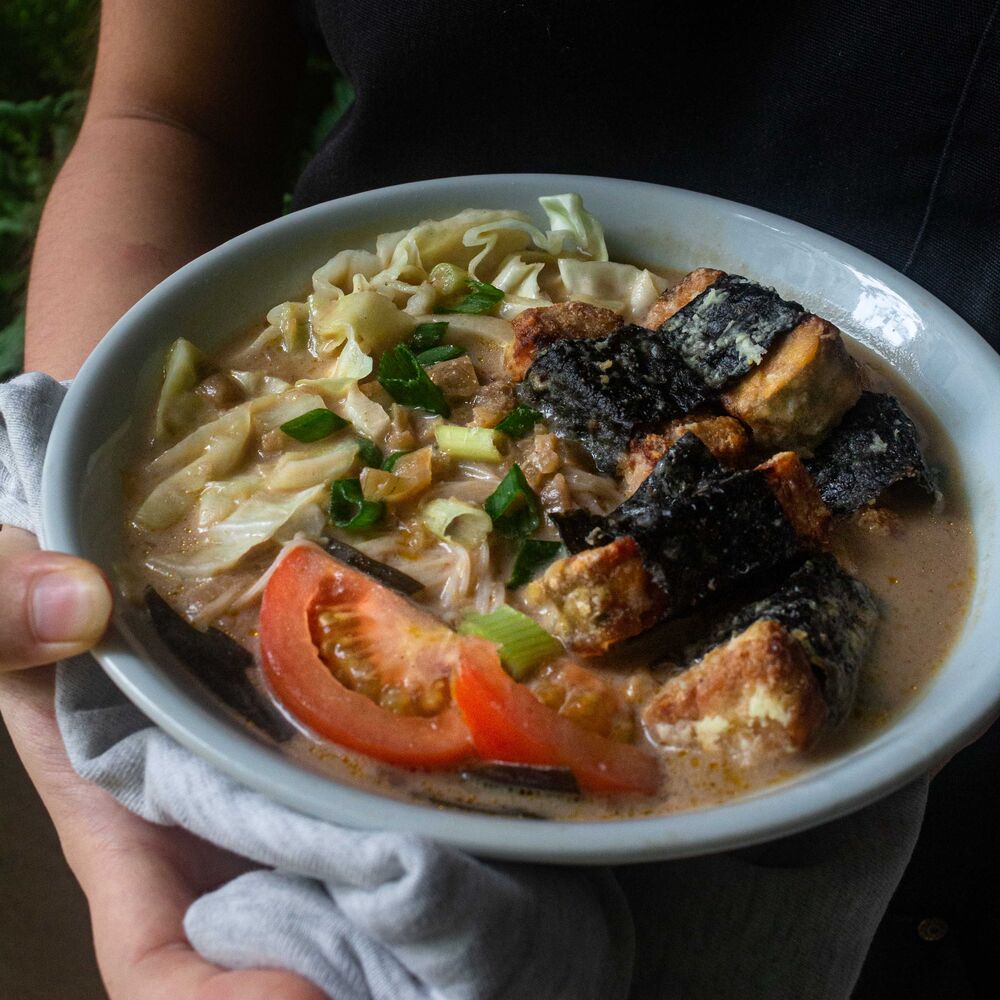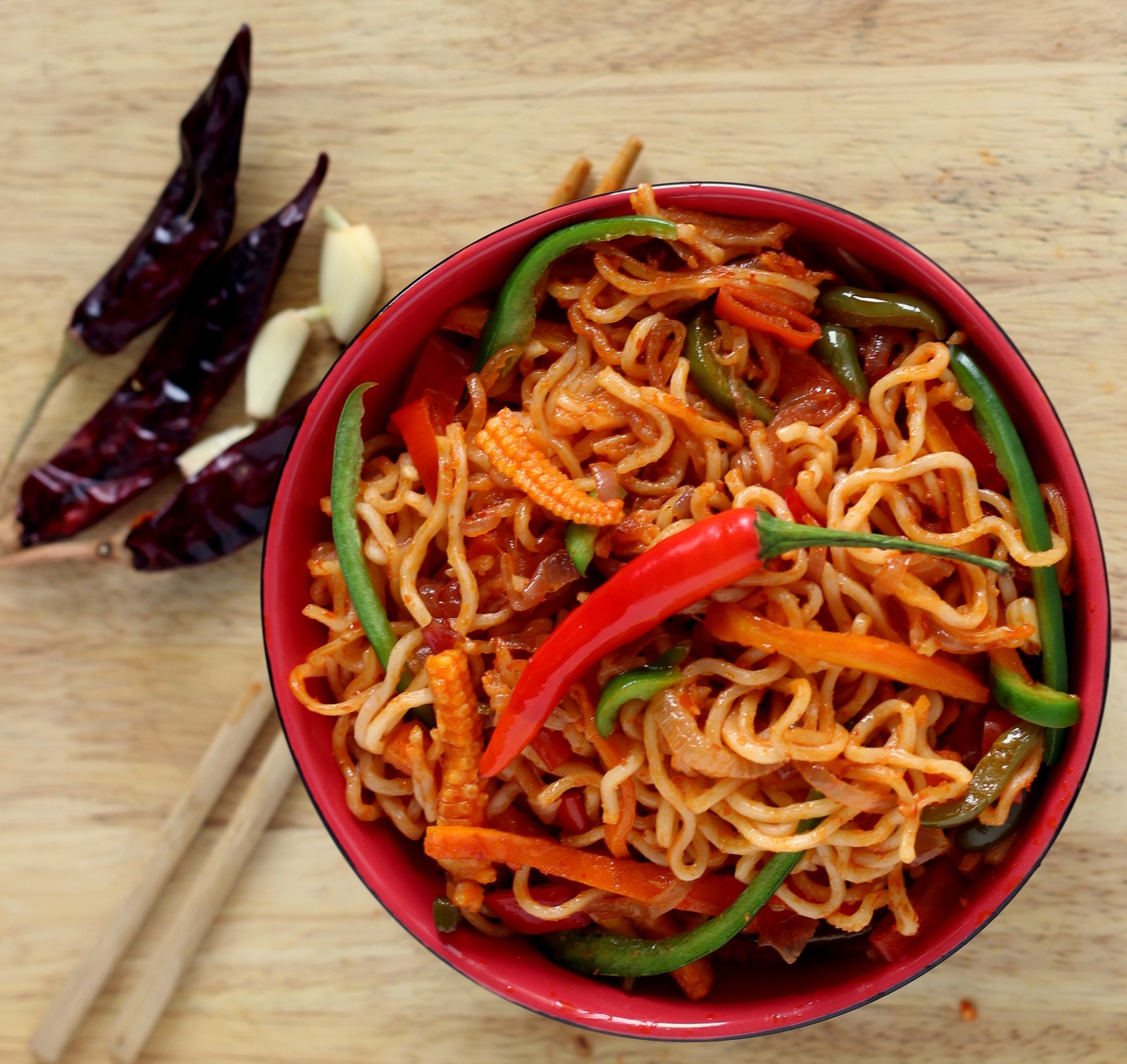Vegetarian mee hoon is a delicious and nutritious dish that is perfect for a quick and easy meal. Made with a variety of vegetables, sauces, and seasonings, this dish is packed with flavor and can be easily customized to your liking.
In this guide, we will provide you with a step-by-step recipe for vegetarian mee hoon, as well as some tips and tricks for making the most of this dish. We will also discuss the nutritional value of vegetarian mee hoon and provide some suggestions for serving it.
Ingredients
The vegetarian mee hoon recipe calls for a diverse range of ingredients that contribute to its delectable flavors and textures. These ingredients can be categorized based on their purpose:
Vegetables
- Mee hoon (rice vermicelli): The primary ingredient, providing the noodle base for the dish.
- Carrot: Adds sweetness, color, and a crunchy texture.
- Cabbage: Provides a crisp and fresh element to the dish.
- Green onions: Enhance the flavor with their pungent and aromatic qualities.
- Bean sprouts: Add a refreshing crunch and nutritional value.
Seasonings
- Soy sauce: Provides a salty and umami flavor.
- Sesame oil: Enhances the dish with its nutty and aromatic qualities.
- White pepper: Adds a subtle warmth and spiciness.
- Sugar: Balances the flavors with a touch of sweetness.
Sauces
- Hoisin sauce: A thick and flavorful sauce that adds sweetness and umami.
- Oyster sauce: Optional, but provides a rich and savory depth of flavor.
Optional Ingredients
To enhance the dish further, consider adding:
- Mushrooms: Provide an earthy and umami flavor.
- Tofu: Adds a protein-rich element to the dish.
- Chilli flakes: Add an extra kick of heat.
Cooking s
Once the ingredients are prepared, cooking the vegetarian mee hoon is a straightforward process that can be completed in under 30 minutes.
Begin by heating the oil in a large skillet or wok over medium heat. Add the garlic and ginger and cook until fragrant, about 30 seconds.
Stir-frying the Vegetables
Add the carrots, celery, and bell pepper to the skillet and stir-fry until they begin to soften, about 5 minutes. Push the vegetables to one side of the skillet and add the eggs. Scramble the eggs until cooked through, then combine them with the vegetables.
Adding the Noodles and Sauce
Add the mee hoon noodles to the skillet and stir-fry until they are warmed through, about 2 minutes. Pour in the soy sauce, oyster sauce, and sesame oil and stir to combine. Cook for an additional minute or two, or until the noodles are coated in the sauce.
Finishing Touches
Remove the skillet from the heat and stir in the green onions. Serve immediately, garnished with additional green onions or cilantro if desired.
Variations
The versatility of vegetarian mee hoon allows for countless variations, accommodating diverse preferences and dietary needs.
Experimenting with different vegetable combinations, sauces, and seasonings can transform this dish into a culinary masterpiece.
Vegetable Combinations
Substitute or add vegetables based on your liking. Broccoli, cauliflower, carrots, bell peppers, mushrooms, and baby corn are excellent choices.
Sauces
For a richer flavor, try substituting soy sauce with teriyaki sauce or hoisin sauce. Sriracha or chili paste can add a spicy kick.
Seasonings
Enhance the dish’s flavor with a sprinkle of sesame seeds, chopped peanuts, or crispy shallots. A dash of black pepper or chili flakes can also elevate the taste.
Dietary Restrictions
Make the recipe gluten-free by using gluten-free soy sauce and tamari. For a vegan version, omit the eggs and use plant-based substitutes for the oyster sauce and fish sauce.
Serving Suggestions
Complement your vegetarian mee hoon with an array of accompaniments and side dishes to elevate its flavor and presentation. These additions will enhance the overall dining experience and cater to diverse preferences.
For a complete and balanced meal, consider serving your mee hoon with a protein-rich dish, such as stir-fried tofu or tempeh. These plant-based options provide essential amino acids and a satisfying texture.
Garnishes and Toppings
Transform your vegetarian mee hoon into a visually appealing masterpiece with an array of garnishes and toppings. Sprinkle chopped green onions or cilantro for a burst of freshness and color. Add a drizzle of sesame oil or soy sauce to enhance the umami flavor.
Top with crispy fried shallots or peanuts for added crunch and texture.
Presentation Ideas
Elevate the presentation of your vegetarian mee hoon by using creative serving techniques. Consider arranging the noodles in a nest-like shape or creating a colorful vegetable medley on top. Drizzle a vibrant sauce or dressing around the edges of the plate to add visual interest.
Nutritional Information

Vegetarian mee hoon is a nutritious and balanced dish that provides essential nutrients for a healthy diet.A typical serving of vegetarian mee hoon contains approximately:
Calories
250-300
Carbohydrates
50-60 grams
Protein
10-15 grams
Fat
5-10 grams
Fiber
5-10 grams
Key Nutrients
-
-*Carbohydrates
Mee hoon is a good source of carbohydrates, which provide energy for the body.
-*Protein
The tofu, beans, and eggs in vegetarian mee hoon provide protein, which is essential for building and repairing tissues.
-*Fiber
The vegetables and tofu in vegetarian mee hoon provide fiber, which helps to regulate digestion and promote a feeling of fullness.
-*Vitamins and Minerals
Vegetarian mee hoon is a good source of vitamins and minerals, including vitamin C, vitamin A, iron, and calcium.
Health Benefits
The nutrients in vegetarian mee hoon offer several potential health benefits, including:
-
-*Reduced risk of chronic diseases
The fiber, vitamins, and minerals in vegetarian mee hoon may help to reduce the risk of chronic diseases such as heart disease, stroke, and type 2 diabetes.
-*Improved digestion
The fiber in vegetarian mee hoon helps to regulate digestion and prevent constipation.
-*Increased energy levels
The carbohydrates in vegetarian mee hoon provide energy for the body, which can help to improve energy levels and reduce fatigue.
Comparison to Non-Vegetarian Dishes
Vegetarian mee hoon is a healthier alternative to non-vegetarian dishes such as chicken or beef mee hoon.
Non-vegetarian mee hoon typically contains more saturated fat and cholesterol, which can increase the risk of heart disease and other health problems. Vegetarian mee hoon, on the other hand, is low in saturated fat and cholesterol and provides more fiber and vitamins.
Additional Tips
Enhance the flavor and texture of your vegetarian mee hoon with these tips:
- Use a variety of vegetables to add color, texture, and nutrients to the dish.
- Add a splash of soy sauce or fish sauce to enhance the savory flavors.
- Top with a fried egg or crispy shallots for extra crunch and flavor.
Common Mistakes to Avoid
Avoid these common mistakes to ensure a perfect vegetarian mee hoon:
- Overcooking the noodles: Noodles should be cooked al dente, with a slight bite to them.
- Using too much sauce: The sauce should complement the noodles, not overpower them.
- Not seasoning the vegetables: Season the vegetables with salt and pepper before stir-frying to enhance their flavor.
Cultural Significance
Vegetarian mee hoon is a popular dish in Southeast Asia, particularly in Malaysia and Singapore. It is often served as a breakfast or lunch dish, and is a staple food for vegetarians and vegans. The dish is believed to have originated in China, where it is known as “chow mein.”
Last Point
Vegetarian mee hoon is a versatile and delicious dish that can be enjoyed by people of all ages. It is a great way to get your daily dose of vegetables, and it is also a good source of protein and fiber.
We encourage you to experiment with different vegetables, sauces, and seasonings to create your own unique vegetarian mee hoon recipe.
Questions and Answers
What are some common mistakes to avoid when making vegetarian mee hoon?
Some common mistakes to avoid when making vegetarian mee hoon include overcooking the vegetables, using too much sauce, and not seasoning the dish properly. It is important to cook the vegetables until they are tender but still have a bit of a crunch.
You should also use just enough sauce to coat the vegetables and noodles, and be sure to season the dish to taste.
What are some variations on the vegetarian mee hoon recipe?
There are many variations on the vegetarian mee hoon recipe. You can add different vegetables, such as carrots, celery, or broccoli. You can also use different sauces, such as a hoisin sauce or a sweet and sour sauce. And you can add different seasonings, such as ginger, garlic, or chili peppers.
How do I make vegetarian mee hoon more visually appealing?
There are a few things you can do to make vegetarian mee hoon more visually appealing. First, use a variety of colorful vegetables. Second, arrange the vegetables and noodles in a visually appealing way. And finally, garnish the dish with fresh herbs or a squeeze of lime juice.

